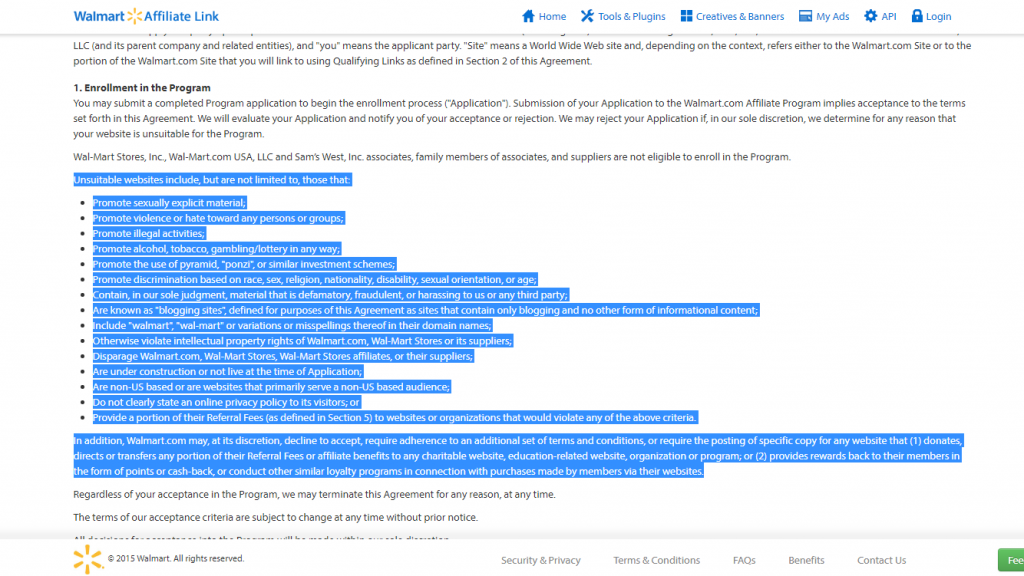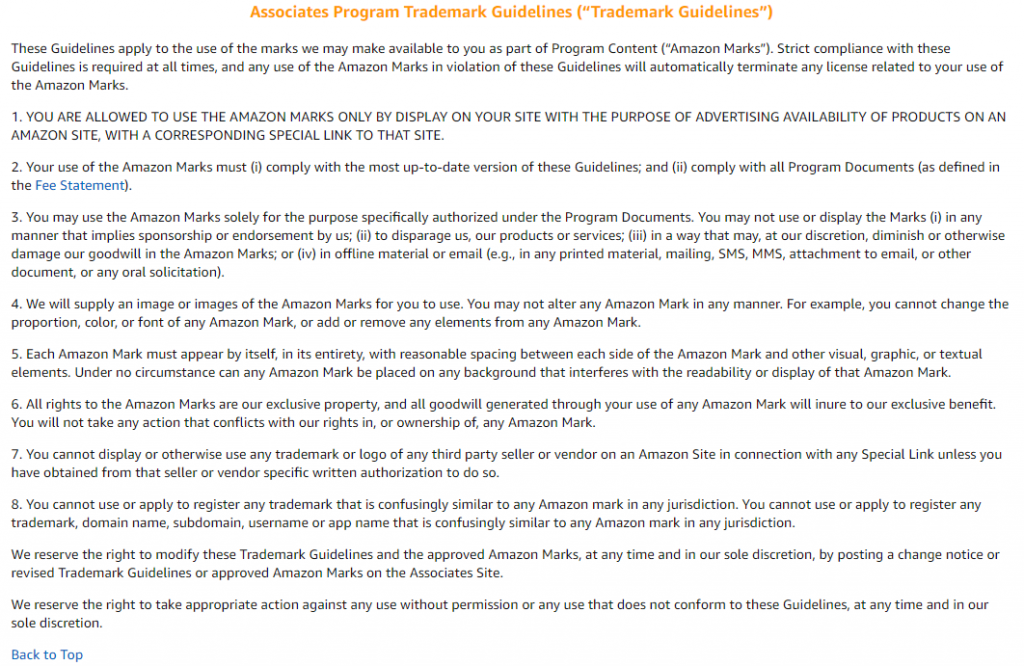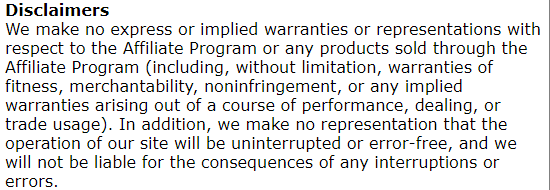If you are setting up an affiliate program, you will need to take time to create an affiliate program agreement for it. Launching a program without clear rules or policies put in place is always a huge mistake. Our very own Geno Prussakov warns about it in his post on common affiliate program setup mistakes.
 Affiliate program’s agreement — sometimes also called its Terms of Service, Terms and Conditions, or Operating Agreement — is the contract regulating your business relationship with your affiliates.
Affiliate program’s agreement — sometimes also called its Terms of Service, Terms and Conditions, or Operating Agreement — is the contract regulating your business relationship with your affiliates.
Without it, you’d be giving your affiliates a free pass to market your brand, products, or services in any way they see fit. After all, any practices that you do not explicitly prohibit are, implicitly, permitted.
As a merchant, your goal is to prevent and fight affiliate fraud, not encourage it. A lack of Terms of Service agreement could be interpreted as an encouragement of bad affiliate behavior. Additionally, it will most likely discourage good affiliates from joining your program, if not in the beginning, surely later down the road. What is worse, it will cost you money and, possibly, harm your brand and reputation.
How do you come up with a sound affiliate program agreement and what should a comprehensive agreement cover? If you had a good program manager steering your affiliate marketing program, you wouldn’t be here. Experienced affiliate program managers know the importance of rules and policies and have no trouble creating and updating them according to the specifics of each program.
Therefore, one solution to create an excellent affiliate program agreement would be to choose a competent and dedicated affiliate manager and let them take over. The other solution is to follow our step-by-step guide below. Before implementing it, do not forget to study your competition and adjust your strategy to the specifics of your business, industry regulations, and affiliate program details.
The Complete Guide to Creating an Affiliate Program Agreement
As mentioned above, your affiliate program agreement will regulate your relationship with your affiliates and it will lay out each party’s rights and obligations. As a merchant, you get to put forth how you want your products or services marketed. However, you want to do it in an affiliate-friendly manner, and that means keeping it clear and to the point.
Unfortunately, too many brands mistake being “to the point” for “program agreements” that are way too brief (or way too generic) to safeguard them from possible future abuse. Here’s one such example from ShareASale affiliate network:

To be clear, we believe ShareASale to be one of the indisputable leaders among the available affiliate tracking solutions. However, it is not the network’s role to dictate merchant-specific rules. Each affiliate network has its own operating rules for affiliates to follow within the network but individual program rules and policies should be outlined in individual program agreements.
In what follows, we will discuss what your program’s terms of service should cover and how you should approach it. Take your time on each section, look up examples, and don’t hesitate to ask for our help if you need it.
If you haven’t yet grabbed a copy of Geno’s Affiliate Program Management: An Hour a Day, now would be a good time to do it. Besides providing valuable advice on the topic, it also includes a sample affiliate program agreement that you can easily adjust to fit your business and program.
Here is what your program agreement should cover and what you should pay attention to:
I. Foreword
It is basically the introduction to your agreement. In it, you assure your affiliates of your good intentions, explain the purpose of the agreement, and invite them to contact you if they have any question. Keep it short and to the point, no longer than 200-250 words.
II. Terms and Definitions
If you are worried that your affiliates may not fully or clearly understand some of the terms you use in your agreement, then do not hesitate to provide the corresponding definitions.
Many major merchants use such lists, and you have nothing to lose by doing it. Again, keep it short and to the point. Your goal is to avoid misunderstandings, not put together an endless glossary.
III. Summary
The unfortunate reality is that affiliates do not always read program policies, especially when these are long and stuffed with generalities. To encourage reading and minimum compliance, you’ll want to provide them with a summary. Put together a list of up to ten sentences explaining:
- The type of content you do not want associated with your products or services
- The type of affiliates you will not accept into your program
- The requirement that affiliates comply with FTC’s Endorsement Guidelines
- Behaviors and practices you condemn and penalize, etc.
This way, publishers who do not fit the profile will hopefully not apply to join your program. Those genuinely interested in promoting your products or services and who are fearful of disloyal competition will likely keep reading.
Before you move on to the actual affiliate agreement, make sure you emphasize its binding nature. For example, in his sample agreement, Geno includes a warning to publishers that by applying to join the affiliate program or participating in it, they are confirming that they have read the agreement and the company’s terms and conditions and they agree to be bound by them. FatCow adhered to this practice as well.
IV. Enrollment
In this section, you explain the enrollment/acceptance process and, especially, the type of publishers that should not even bother applying. Depending on the specifics of your program, you can keep it simple, like Overstock on CJ, or you can get into more details, like Walmart on Rakuten.
Like most merchants, Overstock bans the use of materials containing explicit sex, violence, discrimination, or promoting illegal activities.
Walmart gets into more details and also discourages publishers who promote “ponzi”, pyramid, similar investment schemes, tobacco, alcohol, or gambling. They do not approve of blogging-only platforms, non-US publishers, incentive and loyalty affiliates, and anyone willing to share their referral fees with a website or organization in violation of their criteria for publishers.
You know your business better than anyone, and it is up to you to decide what type of associations would negatively impact your brand. This is the section where you get to rule out such associations and tell potential affiliates what to expect.

V. Affiliate Disclosure
As you may already know, the Federal Trade Commission requires anyone endorsing a brand, program, or service in exchange for or as a result of receiving certain benefits to disclose their receiving of the benefits. Affiliates obviously fall into this category, and you want yours to comply with the law.
Therefore, it makes sense to include a clause in your agreement requesting that they disclose their status as your affiliates. Geno strongly recommends it in his book, and most merchants have such clauses in their affiliate agreements.
You can follow the lead of Amazon, and impose a certain phrase for your affiliates to use for disclosure purposes. Another option is to create a dedicated graphic image and ask your affiliates to display it on their website (see link to Overstock agreement above).
However, since your affiliates may promote other merchants as well, imposing certain phrases or graphic images could work against you. I see no reason why you would not leave the wording of the disclosure to them and just make it clear that:
- You advise and request compliance with the FTC guidelines, at least as far as your products or services are concerned.
- You reserve the right to terminate your relationship with affiliates who do not comply.
VI. Trademark Policy
As a merchant, you want to deter trademark violators from joining your affiliate program. They would be stealing traffic from you, leads and sales from your affiliates, and, possibly, negatively impact your image and reputation.
To prevent that, you need to clearly regulate potential uses of your trademark. You’ll want to prohibit any use of your trademark and variations and misspellings of it in paid search campaigns, domain names, hidden text, source codes, meta tags, user names, app names, etc.
Any font, color, and logo modifications should be prohibited as well. Your affiliates should only be allowed to use your trademark for expressly authorized purposes, as long as their use of it does not harm your interests and reputation. Any other uses should be subject to your prior approval.
If you check the affiliate agreements given as examples above (see screenshot from Amazon below), you will see that all of them cover trademark use, some in more than one section of their agreement. It is better to repeat yourself than to leave room for interpretation and fraud.

VII. Policies on Promotional Methods
Unless you clarify what marketing practices you accept or reject, you’re giving your affiliates a free pass to do whatever they want in order to generate sales, leads, or any other types of actions you reward.
They could provide misleading or false information, promise rewards and incentives your customers will never see, use some of their commission to generate false leads, develop mobile apps that force certain in-app actions, and more.
You want to discourage such type of practices because they could cost your money, your reputation, and your affiliates. How do you do it? Create rules. They should cover at least the following aspects:
1. Content
Make it mandatory for your affiliates to provide readers with clear and accurate information about your products or services. Exaggerations lead to disappointment and sales reversals and harm your brand.
2. Videos
If you have affiliates who do unboxing or how-to tutorials, create special rules for them, to make sure their marketing strategy aligns with yours and benefits your business in the long run. You can even ask to pre-approve any videos they record or create before they publish it online.
3. Coupons and Discounts
It is up to you if you accept coupon affiliates or not (open or closed coupons policy), but make it clear in your affiliate program agreement. FatCow, for example, does not allow affiliates to post refunds, discounts, or credits on their products or services without their prior written consent given on a case-to-case basis. Their affiliates may only use the coupons and discounts made available to them through the program, and any modifications to them are clearly prohibited.

4. Incentivized Traffic
If you’re a retail-oriented merchant, you do not want to ban loyalty affiliates from joining your program. However, when running a lead-generating affiliate program, you need to protect yourself and your good affiliates from scam artists who may recruit and pay internet users to order samples, complete surveys, or fill in forms. They may drive many leads to your website, but those leads will be of poor quality, will cost you a fortune, and will almost never convert into paying customers.
5. Mobile Apps
Sometimes, affiliates use in-app ads to drive sales and leads. You may want to follow Amazon’s lead (see their Mobile Application Policy) in regulating such practices and approving apps individually, to prevent forced clicks, copies of your own app, and other attempts to deceive potential customers.
6. Paid Search Campaigns
It is up to you if you allow paid search campaigns. Some merchants do, some do not. If you do, you want to make sure your affiliates don’t bid on your trademark, service marks, product names, and any other terms that would allow them to steal traffic and clients from your website. The least you can do is provide them with a list of keywords to bid on or to avoid.
Generally, you should provide your affiliates with a generous inventory of affiliate creatives or the tools to generate their marketing materials themselves, prohibit any changes to those materials, and forbid the creation and use of any other materials without your prior consent.
7. Other Behaviors
We’ve already covered many of the practices and behaviors your affiliate program agreement should prohibit. However, these are serious issues that you’ll want to list separately for your affiliates to be able to easily refer to them.
Take the time to make an exhaustive list of what you do not want and allow your affiliates to do and include it in your affiliate program agreement. It will hopefully keep fraudsters at bay and earn you the trust and consideration of some good affiliates.
Walmart has a complex policy in this sense, addressing not only general prohibitions but also electronic communication and trademark prohibitions. Reviewing their policy could be a great starting point for you to build yours. Here’s also an example of how Dinnerly‘s affiliate promotional methods’ policies are reflected on Awin (at the time of this publication):

VIII. Affiliate Rights and Obligations
Some merchants will only cover affiliate obligations. Others will have different clauses that could very well fit under this section. The bottom line is this:
- Your affiliates have the right to get paid for any qualifying actions they send to you following your program agreement.
- Depending on how you run your affiliate marketing program, they may have access to an affiliate account, creatives, and various tools and materials they may use to promote your products and services.
- They have the obligation to comply with your affiliate program agreement and any other applicable laws and regulations (copyright, intellectual property, etc.).
IX. Merchant Rights and Obligations
As a merchant, it is your right to:
- Monitor how your affiliates promote your products or services
- Modify your program agreement when and as you consider it appropriate
- Take measures against affiliates who do not comply with the agreement (You can terminate the agreement immediately and, maybe, retain any commissions they may have generated through fraudulent activities. We do not advise resorting to commission cuts to fight agreement violations but the final decision is yours.)
Assuming there are no agreement breaches or fraudulent activities for you to worry about, you have the obligation to pay your affiliates according to the agreed payment terms.
X. Relationship of the Parties
Some merchants find it necessary to clarify their relationship with their affiliates. I do not see any reason not to include such a section in your affiliate program. You are basically clarifying that your affiliates are independent contractors and prohibit them from mentioning or implying other types of relationship, be it joint venture, partnership, representation, franchise, employment, etc.
XI. Warranties and Representations
Your affiliate program agreement should stipulate that its coming into effect means that your affiliates represent and warrant to you that:
- They have reviewed, understood, and accepted the agreement as binding
- Their acceptance of the agreement and participation in the affiliate program does not violate any violate any laws, rules, regulations, court orders, decrees, by-laws or incorporation certificates, agreements or instruments applicable to them or binding upon their properties or assets.
- They are the only and exclusive owners of their trademark and have the authority to grant you use of their trademark (if applicable) – See the Indemnification section below.
- There are no threatened, pending, or ongoing claims or actions (or reasons for such claims or actions) against them or their affiliates.
- They do not depend on third-party consent, authorization or approval to enter the agreement.
- The content on their website does not and will not violate the agreement.
- They are of legal age to enter the agreement.
- The customers they refer are unique, genuine, valid, and in compliance with your qualified action criteria.
XII. Payment Policy
We’ve already discussed payment terms, methods, and types in a previous post, so I’m not going to get into too many details. Your affiliates need to know:
- What methods you use to track and process payments
- The value of the commissions you pay for each qualifying action
- How and when you make payments
If you run your program on an affiliate network, you can simply redirect them to the network’s payment terms. When you run it in-house, some in-depth information may be necessary. If you’re ready to launch your affiliate program, it means you have already sorted out these details. Explaining them in the agreement should be easy.
XIII. Terms of the Affiliate Program Agreement
This section — devoted to the agreement’s terms, modification, and termination — stipulates when the agreement becomes effective, and the circumstances in which it can be modified or terminated. We advise you to keep it simple and to the point:
- The agreement becomes effective as soon as the affiliate is accepted into the program.
- As a merchant, you are the only party who has the right to make modifications to it and you reserve the right to do it anytime.
- Both parties may terminate the agreement anytime, without warning periods or prior notifications.
This does not mean that you should not notify your affiliates when you bring modifications to the agreement or you decide to exclude them from your program. It just means you reserve the right not to do it.
XIV. Disclaimer(s)
You will want to make it clear to your affiliates that you offer no implied or express representations or warranties regarding your affiliate program and the products or services sold through it (including but not limited to warranties referring to fitness, non-infringement, merchantability, or implied warranties related to dealing, performance, or trade usage).
You will also want to exclude warranties or representations regarding the uninterrupted or error-free functionality of your website and their potential consequences (including referral tracking during the interruption period).

XV. Liability
Your affiliate program agreement should clearly state that you will not be held liable for any damages or losses of data, profits, or revenue related to the agreement or the affiliate program, not even if you were advised that such damages may be possible.
If you decide to assume liability in certain circumstances, make sure you set a limit. For example, FatCow limits their aggregate liability to the total commissions they paid or owe to their affiliate for the three months preceding the event that brought about their liability.
XVI. Indemnification
This section of the agreement should request your affiliates to hold harmless and indemnify you, your company, and any affiliates, subsidiaries, partners, employees, and service providers against any losses based on or arising out of:
- Claims that your use of the affiliate trademarks qualifies as an infringement to trademarks, trade names, service marks, copyright, licenses, intellectual property, and/or any other third-party rights
- Misrepresentations of representations or warranties or breaches of covenants and agreements made by the affiliate through your program agreement
- Claims related to your affiliates’ websites, including but not limited to their development, functionality, maintenance, and content (not attributable to you)
XVII. Confidentiality
It makes sense to include a confidentiality section in your agreement in order to protect sensitive data regarding your business, your customers, and any affiliates, associates, and collaborators. You are basically requesting that any information you exchange with your affiliates, including the content of your agreement, only be used within the scope of the agreement.
The only exceptions allowed are instances where such information is requested by the authorities, already disclosed, necessary for accounting or other legal purposes, or subject to lawfully obtained disclosure rights.
XVIII. Remedies
If you are worried about the consequences that your affiliates’ violation of the agreement might cause, you can reserve the right to claim remedies. Besides terminating the agreement immediately and withholding their referral fees, you may claim injunctive relief and statutory, actual, or punitive damages.
XIX. Limited License
Some merchants include in their affiliate program agreement a separate clause regarding the nonexclusive, revocable right they grant to their affiliates for the use of their text, graphics, trademark, and related materials. Make it clear that your affiliates should only use these materials to disclose their role as your affiliates and promote your products and services. It is your right and a smart idea to prohibit any modifications to them.
XX. Miscellaneous
If there is anything else you would like to mention or clarify in your affiliate program agreement, you can do it under this section. Most merchants choose to cover governing laws and legal action guidelines in this section. Some even warn that their failure to enforce any provisions of the agreement does not mean they are waiving their right.
Final Advice on Creating and Enforcing Your Affiliate Program Agreement
 If this is your first time contemplating the creation of an affiliate program agreement, you may feel overwhelmed and discouraged. Take a step back, breathe deeply, and give yourself some time. Many of the sections reviewed above reinforce the same requirements. Some of them may not even be necessary for your program.
If this is your first time contemplating the creation of an affiliate program agreement, you may feel overwhelmed and discouraged. Take a step back, breathe deeply, and give yourself some time. Many of the sections reviewed above reinforce the same requirements. Some of them may not even be necessary for your program.
Should you forget or neglect something, you can always make amendments and/or create new (and expanded) versions of your agreements later on. And, most importantly, you do not have to and should not do everything yourself. Agencies like ours exist to take the burden off your shoulder and ensure the results you hope for. Once you’ve found a competent specialist, they will handle the creation and adjustment of your affiliate program agreement.
If you are set on doing everything yourself, you should review several examples of affiliate agreements. While doing it, take the specifics of your business and affiliate program into account. Don’t hesitate to use our affiliate program agreement template and adjust it to your program’s needs and specifics; but do consult with an attorney if you find it necessary. We are not attorneys and none of the above should be treated as legal advice.
Finally, if you need help with the management of your affiliate program, creation of your affiliate agreement, or just an unbiased opinion on your affiliate program or strategy, do get in touch! Being a company that specializes in affiliate management, we’ll do our best to provide you with the answers and solutions you need as soon as possible.

Nice work, this is super thorough and it addresses a question that we get asked from time to time. I also wasn’t aware that you had a template available – this will be a great resource for us to point them towards in the future!
Thanks, Dave. Yes, do let them know about that template.